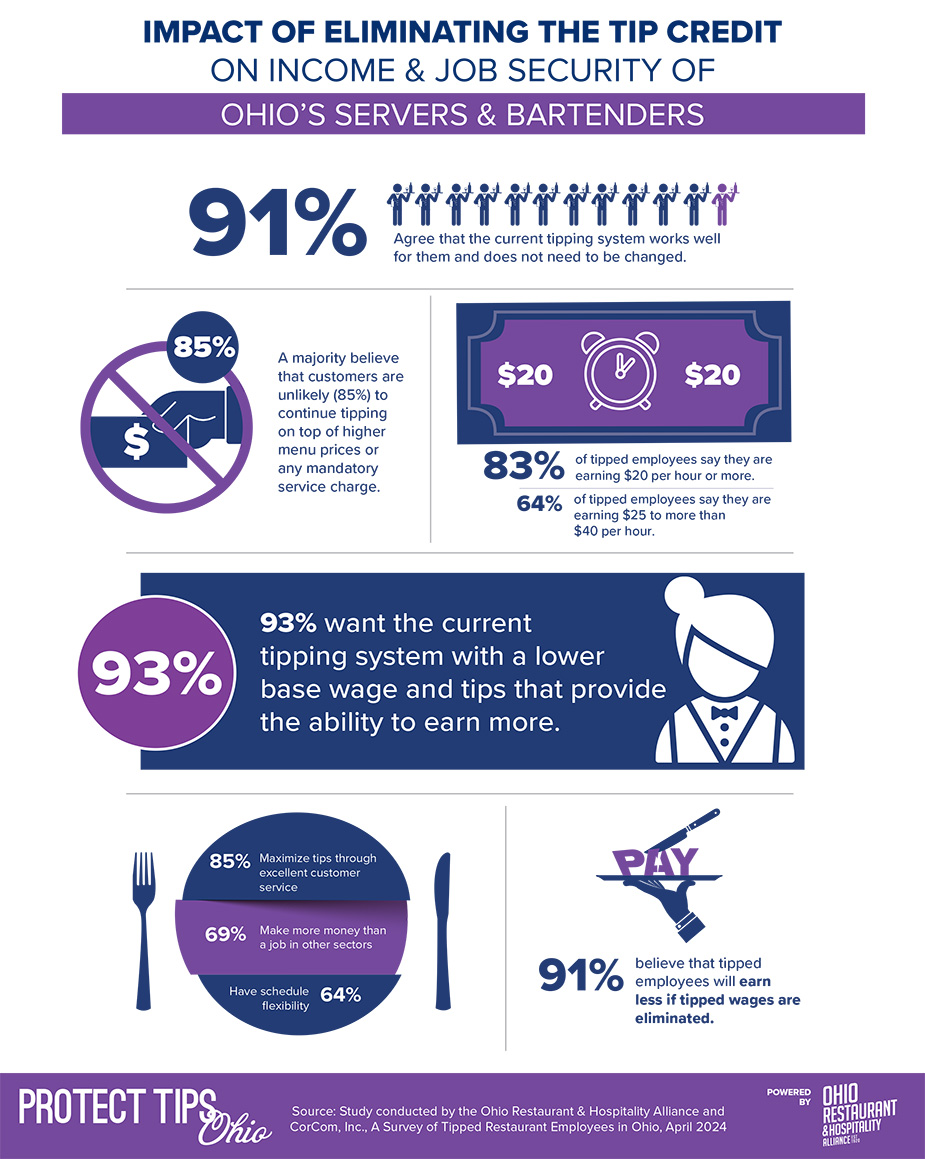Keep the Tipped Wage, Restaurant Workers Say in Survey
COLUMBUS, Ohio – The state’s bartenders and servers overwhelmingly prefer to maintain the tipped wage, according to a survey released Tuesday by the Ohio Restaurant and Hospitality Alliance.
The online survey received responses from 990 tipped employees, with 93% saying they want to maintain the status quo.
It was conducted in April by Pittsburgh-based CorCom consulting firm and has a 3% margin of error, according to Lloyd Corder, CEO of the company.
The survey results are the latest salvo in ORHA’s battle against an effort to sharply raise the minimum wage and eliminate the tipped wage.
One Fair Wage, a Massachusetts-based organization, is seeking to put a measure on the November ballot to amend the Ohio constitution by increasing the minimum hourly wage from $10.45 to $15 by Jan. 1, 2026, and eliminating the tipped wage.
The Business Journal asked One Fair Wage for its response to the survey but did not receive a reply in time for this article.
John Barker, executive director of ORHA, said the survey results “send a thunderous message – servers and bartenders do not want this outside group to mess with their tips.”
CorCom’s Corder said 77% of the survey respondents were female, and 79% were between ages 18 and 45. Sixty-one percent worked in casual dining restaurants, and 50% have been working in the industry for more than 10 years.
ORHA commissioned the survey.
One Fair Wage is attempting to collect enough signatures to put the amendment on the ballot. The state will determine whether it succeeded in July.
According to the ORHA survey, 83% of tipped workers say they earn $20 per hour or more, and 64% say they earn $25 to over $40 per hour.
If the tipped wage is eliminated, 91% believe they will earn less money.
If the constitutional amendment passes, ORHA says restaurants will raise their prices by 20% to 25%, according to Barker.
The most recent entity to eliminate the tipped wage is Washington, D.C., which repealed it in November.
Since then, the district has lost 3,700 jobs at full-service restaurants, said Tod Bowen, government relations director for ORHA. Most of the restaurants fled to suburbs that still maintain the tipped wage, he said.
Some Washington restaurants have started adding a service charge to customers’ checks to compensate for the increased wage expense, Bowen said.
According to the ORHA survey, 85% of Ohio tipped workers believe customers are unlikely to continue tipping if they must pay an extra charge for service.
“Why would an outside group try to force this no-win situation on Ohio?” Barker rhetorically asked during a press conference to announce the survey results. “The current system works well,” he said, noting that 93% of restaurant operators oppose elimination of the tipped wage.
Bowen said tipped workers across the state tell him they want the tipping system to remain as is. “They do not want this, and now we have the numbers to back it up,” he said.
If the proposed amendment does make it on the fall ballot, Bowen said ORHA believes it will be voted down.
The restaurant and hospitality industry is the state’s third largest, employing 546,000, according to ORHA.

Copyright 2024 The Business Journal, Youngstown, Ohio.



